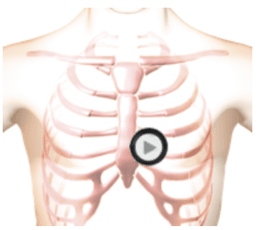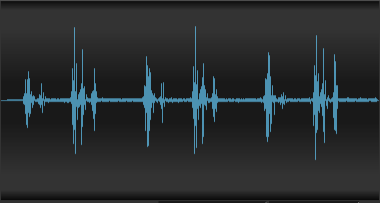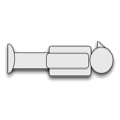This is an example of Ebstein's Anomaly as heard at the tricuspid area.
The first heart sound is increased due to thickening of the tricuspid valve leaflets.
The second heart sound is normal.
A rectangular murmur of tricuspid regurgitation fills all of systole.
An opening snap occurs 100 milliseconds into diastole followed by a decrescendo-crescendo murmur of mitral stenosis.
These findings are all a manifestation of downward displacement of the tricuspid valve into the right ventricle
In the anatomy video you can see the enlarged right atrium and the small right ventricle. The upward plume from the right ventricle to the right atrium represents the systolic murmur.
The downward plume from the right atrium to the right ventricle represents the diastolic murmur.
This abnormality is congenital in nature.
Ebstein's Anomaly Audio


Patient Sounds


Half Speed Patient Sounds


Technique

The patient's position should be supine.
Auscultation Tips
S1:Increased intensity. Possible splittingSystole:Rectangular
S2:Possible splitting.
Diastole:Opening snap followed by decrescendo-crescendo murmur
Sound Wave
Observe Cardiac Animation
Review the cardiac animation. Notice the enlarged right atrium and the small right ventricle. The upward plume from the right ventricle to the right atrium represents the systolic murmur.
The downward plume from the right atrium to the right ventricle represents the diastolic murmur.
Authors and Sources
Authors and Reviewers
- ECG heart rhythm modules: Thomas O'Brien.
- ECG monitor simulation developer: Steve Collmann
-
12 Lead Course: Dr. Michael Mazzini, MD.
- Spanish language ECG: Breena R. Taira, MD, MPH
- Medical review: Dr. Jonathan Keroes, MD
- Medical review: Dr. Pedro Azevedo, MD, Cardiology
- Last Update: 11/8/2021
Sources
-
Electrocardiography for Healthcare Professionals, 6th Edition
Kathryn Booth and Thomas O'Brien
ISBN10: 1265013470, ISBN13: 9781265013479
McGraw Hill, 2023 -
Rapid Interpretation of EKG's, Sixth Edition
Dale Dublin
Cover Publishing Company -
EKG Reference Guide
EKG.Academy -
12 Lead EKG for Nurses: Simple Steps to Interpret Rhythms, Arrhythmias, Blocks, Hypertrophy, Infarcts, & Cardiac Drugs
Aaron Reed
Create Space Independent Publishing -
Heart Sounds and Murmurs: A Practical Guide with Audio CD-ROM 3rd Edition
Elsevier-Health Sciences Division
Barbara A. Erickson, PhD, RN, CCRN -
The Virtual Cardiac Patient: A Multimedia Guide to Heart Sounds, Murmurs, EKG
Jonathan Keroes, David Lieberman
Publisher: Lippincott Williams & Wilkin)
ISBN-10: 0781784425; ISBN-13: 978-0781784429 - Project Semilla, UCLA Emergency Medicine, EKG Training Breena R. Taira, MD, MPH
-
ECG Reference Guide
PracticalClinicalSkills.com
Ebstein's Anomaly | Auscultation Cheat Sheet with Sounds & Video | #117